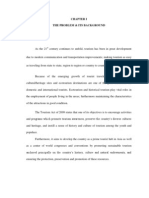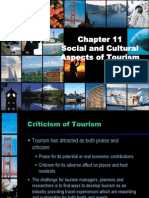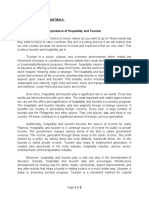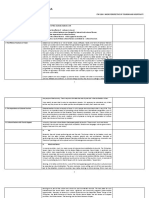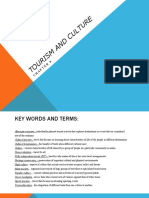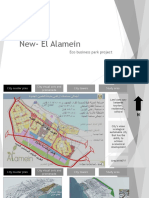Tourism 6
Tourism 6
Uploaded by
Silke HerbertCopyright:
Available Formats
Tourism 6
Tourism 6
Uploaded by
Silke HerbertOriginal Title
Copyright
Available Formats
Share this document
Did you find this document useful?
Is this content inappropriate?
Copyright:
Available Formats
Tourism 6
Tourism 6
Uploaded by
Silke HerbertCopyright:
Available Formats
TOURISM 6
THE SOCIOCULTURAL IMPACT OF TOURISM 1
Tourism brings people of different nationalities and cultures together. It provides the opportunity
for visitors and locals to interact and to learn about each other’s cultures, which can lead to an
exchange or to a clash.
Visitors’ perception of Caribbean societies
Visitors have a perception of Caribbean societies before they even arrive in the region.
This perception is gained from reading tourist brochures and other material that promotes
the area as a tourist destination.
Promotional material is designed to create a favorable impression. Potential visitors also
have access to material in the form reports in the mass media and materials on the
internet which may not always present the region in a favourable light.
Some visitors might interact with members of African-Caribbean communities in their
home country. They can also have feedback from previous visitors. This can be done via
different websites where people are allowed to give reviews on their vacations, and also
comment on all aspects including the standard of accommodation, the degree of service,
the quality of food the sights to be seen and the places of interest. They can also comment
on how far they were made to feel welcome, safe and secure.
One potential visitor might think of Caribbean societies as small, safe, friendly and
uncomplicated. Another might think that they are undeveloped, unsafe or unfriendly. It is
the role of those promoting tourism to foster the ideas of safety and friendliness. It is the
role of citizens to ensure this is reflected in reality.
Influencing a visitor’s perception
A tourist board may seek to influence a visitor’s perception during their stay by:
o Educating tourism workers on the need to display high standards of service and behavior
at all times
o Promoting local Caribbean culture by sponsoring cultural shows to inform visitors
o Providing for cultural exchange
o Encouraging visits to rural areas
o Encouraging high levels of security
o Encouraging fair pricing of tourism services
Opportunities for visitors to meet Caribbean people
Visitors and local residents can meet in a number of circumstances and places including:
o Public beaches
o Festivals and cultural shows
o Sporting events
o Entertainment centres
o Hotels, restaurants and bars
TOURISM 6
o Shopping malls
o Community tourism holidays.
Relationships
Tourism is a service industry and one that very much relies on personal service and the
relationships between those who are providing and receiving the service. There is a degree to
which the relationship between tourists and other citizens, beyond those working in the tourist
industry, is also important. In other words, tourists want to feel welcome.
Tension and conflict might arise between some citizens and some tourists if:
Residents perceive visitors as enjoying privileges that some residents are not allowed to
enjoy in their own country, for example access to some beaches
Residents see visitors as wealthy and therefore exploit or even rob them
Residents offer poor service or are disrespectful
Visitors show a lack of understanding or respect for local culture
Visitors show a lack of respect for residents
Visitors do not engage with a local community but remain inside an all-inclusive resort
Returning nationals annoy residents by criticizing their native country and comparing it
negatively to their adopted country.
Two-way cultural exchange
Tourism offers people the chance to experience a cultural exchange. This can happen for tourists
by attending festivals, especially perhaps local festivals that showcase ‘the real culture’ of their
location. The opportunity to meet together also gives residents of the Caribbean the chance to
find out about the cultures of the visitors’ countries.
Influence of lifestyles, language and dress
Mass tourism can affect the way in which residents adapt their lifestyle, language and even their
dress. For example, residents may change their language to suit tourists’ needs.
You might also like
- Trends and Issues in The Tourism and Hospitality Industry0% (1)Trends and Issues in The Tourism and Hospitality Industry15 pages
- Study On Satisfaction of Tourists in San Miguel, Bulacan Part 284% (19)Study On Satisfaction of Tourists in San Miguel, Bulacan Part 253 pages
- Tourism Brings Negative Cultural and Social ImpactsNo ratings yetTourism Brings Negative Cultural and Social Impacts3 pages
- Module 6: Socio-Cultural Problems of Tourism: Week 1No ratings yetModule 6: Socio-Cultural Problems of Tourism: Week 17 pages
- globalisation and its effects on the worldNo ratings yetglobalisation and its effects on the world16 pages
- Lesson 3 Three Dimensions of Sustainable TourismNo ratings yetLesson 3 Three Dimensions of Sustainable Tourism19 pages
- Int Tourism CH 11 Social and Cultural Aspects of TourismNo ratings yetInt Tourism CH 11 Social and Cultural Aspects of Tourism16 pages
- Review Question 9 About Introduction To Tourism 1No ratings yetReview Question 9 About Introduction To Tourism 18 pages
- Worldwide Travel : A Legal Knowledge Guide An Effective Travel Guide to Avoid Legal Problems in Countries Across the Globe: Costa Rica, Cuba, Brazil, Uruguay Vol IFrom EverandWorldwide Travel : A Legal Knowledge Guide An Effective Travel Guide to Avoid Legal Problems in Countries Across the Globe: Costa Rica, Cuba, Brazil, Uruguay Vol INo ratings yet
- Tme Week 4 Socio Cultural Dimension of Sustainable TourismNo ratings yetTme Week 4 Socio Cultural Dimension of Sustainable Tourism26 pages
- Pages From Jost Krippendorf - The Holiday MakersNo ratings yetPages From Jost Krippendorf - The Holiday Makers5 pages
- Micro_Perspective_Sociology_of_Tourism (1)No ratings yetMicro_Perspective_Sociology_of_Tourism (1)6 pages
- Cultural Tourism and Museums: Barry Lord, Vice PresidentNo ratings yetCultural Tourism and Museums: Barry Lord, Vice President12 pages
- CHAPTER 5-Tourism Impacts On Culture and Society TM 4-30% (1)CHAPTER 5-Tourism Impacts On Culture and Society TM 4-339 pages
- Marketing Strategies for Cultural Heritage Tourism in JamaicaFrom EverandMarketing Strategies for Cultural Heritage Tourism in JamaicaNo ratings yet
- SHALOM ALEICHEM CIFRA Por Misc Traditional at UltiNo ratings yetSHALOM ALEICHEM CIFRA Por Misc Traditional at Ulti1 page
- Rittal 316 Stainless Steel TS 8 Enclosure 5 3065No ratings yetRittal 316 Stainless Steel TS 8 Enclosure 5 30652 pages
- Sport On The Barcoo: Regional Tidy Towns Awards To Tambo and BlackallNo ratings yetSport On The Barcoo: Regional Tidy Towns Awards To Tambo and Blackall10 pages
- An Analysis of The Comparative Power Levels of TransformersNo ratings yetAn Analysis of The Comparative Power Levels of Transformers3 pages
- 1stephen Schwartz Defying Gravity AnalysisNo ratings yet1stephen Schwartz Defying Gravity Analysis5 pages
- Space Opera Seldon S Compendium of Starcraft 2100% (3)Space Opera Seldon S Compendium of Starcraft 250 pages
- Synopsis - Shivanshu Yadav - Online Grocery StoreNo ratings yetSynopsis - Shivanshu Yadav - Online Grocery Store7 pages
- New-El Alamein: Eco Business Park ProjectNo ratings yetNew-El Alamein: Eco Business Park Project12 pages
- More Big Girl Knits by Jillian Moreno and Amy R. Singer - Susie Hoodie Project18% (40)More Big Girl Knits by Jillian Moreno and Amy R. Singer - Susie Hoodie Project7 pages
- ZOHO Corporation Pte LTD: Tax Invoice Tax InvoiceNo ratings yetZOHO Corporation Pte LTD: Tax Invoice Tax Invoice1 page
- Wip Some Personal Notes On Ai Generation On GreekNo ratings yetWip Some Personal Notes On Ai Generation On Greek3 pages
- Unit 5: Exercise 1: Match The Activities With The PicturesNo ratings yetUnit 5: Exercise 1: Match The Activities With The Pictures7 pages
- Whuw Warband Mollogs Mob Cards Download Eng 11-n9uer18ykyNo ratings yetWhuw Warband Mollogs Mob Cards Download Eng 11-n9uer18yky2 pages


